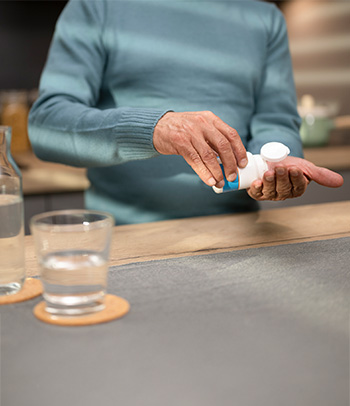With an understanding of the symptoms and causes of peptic ulcers, you can arm yourself with the knowledge you need to keep your stomach in top shape!
Peptic ulcers, often called stomach ulcers, affect more than 4 million people annually in the U.S. and can be extremely painful. But what are they? What causes them? And is there any way to prevent them?
Learn about peptic ulcers and their symptoms, what causes them, and treatment options to treat them.
What Is a Peptic Ulcer?
A peptic ulcer is a sore on the lining of your stomach or duodenum (the first part of your small intestine). They are sometimes called stomach ulcers, duodenal ulcers, or peptic ulcer disease.
What Are the Symptoms?
A burning or dull stomach pain is the most common symptom related to peptic ulcers. It may feel like cramping or even a hunger-like pain. The pain usually starts between meals or during the night when your stomach is empty. It may go away for a short time after eating, but the pain can last from minutes to hours.
However, some people don’t experience any symptoms from a peptic ulcer until the ulcer has created other complications. These more serious symptoms can include:
- Black or tarry stool, or blood mixed with your stool
- Red blood in your vomit or vomit that looks like coffee grounds
- Sudden, sharp or severe stomach pain that doesn’t go away
- Dizziness or fainting
- Loss of appetite
- Unexplained weight loss
- A change or worsening of your symptoms
If you experience any of these symptoms, contact your health care provider right away. They may be a sign that an ulcer has caused bleeding in your stomach or small intestine, or created a hole in the wall of your stomach or small intestine. The above symptoms may also indicate that an ulcer has penetrated another nearby organ, such as the pancreas (a severe problem), or has caused a blockage that has stopped food from moving into your stomach.
What Causes Peptic Ulcers?
The lining of your stomach and duodenum are coated with a thick mucus layer designed to protect them and are replaced rapidly so damaged cells are replaced with new ones. Bacterial infection by H. pylori is the cause of most ulcers. Research in the last 50 years found that H. pylori causes increased acid production that damages the mucus lining and stomach cells.
While there are some rare causes, the most common causes of peptic ulcers include:
- A bacterial infection from Helicobacter pylori (H. pylori), which cause 80% of stomach ulcers and 90% of duodenal (small intestine) ulcers
- Long-term use of nonsteroidal anti-inflammatory drugs (NSAIDs), such as aspirin, ibuprofen and naproxen
- Use of steroids, especially with high blood calcium
- Older age
- Type A blood (stomach cancer) and Type O blood (duodenal ulcers)
- Zollinger-Ellison Syndrome, a disease that causes high acid levels
Ulcers can happen to anyone, but they are more common in older adults, people who smoke, and people who have previously had a peptic ulcer.
Some people believe that ulcers are created by stress or spicy foods, but this isn’t true. Peptic ulcers may be aggravated or made worse by these things, but they are not the reason the ulcers form.
How Do I Treat a Peptic Ulcer?
If you have any symptoms, schedule an appointment with your health care provider. Your health care provider will ask about your symptoms and review your health history. He or she can then test your blood, stool or breath to find the cause of your ulcer. Your provider can also look inside your stomach and duodenum by taking an x-ray or doing an endoscopy. An endoscopy involves inserting a long, thin tube with a tiny camera attached through your mouth into your stomach.
Once the cause of your ulcer is known, your health care provider may recommend one of the following treatments:
- Medicine to reduce your stomach acid production
- Medicine to protect the lining of your stomach and duodenum from acid
- Antibiotics to treat an H. pylori infection
- Surgery (necessary only in rare cases, if ulcers won’t heal or to repair a hole, for example)
Peptic ulcers will get worse if they’re not treated. With treatment, most people fully recover.
How Can I Reduce My Risk for a Peptic Ulcer?
There are steps you can take to reduce your risk for a peptic ulcer, including:
- Quit smoking. Service members and Veterans have higher rates of tobacco use than civilians. Smoking can increase your risk for peptic ulcers. Learn more about smoking cessation services covered by TRICARE and the specialized resources related to quitting smoking from the Department of Veterans Affairs (VA). For more information on how to get help, check out Make a Plan You Can Stick To: Quit Smoking Today.
- Maintain good hygiene habits. To reduce your risk for H. pylori infection, use good hygiene habits such as proper handwashing, especially after using the bathroom and before handling food. Hand-washing 101: Why It Matters can help you review the basics.
- Limit your use of NSAIDs. If you’re taking NSAIDs like ibuprofen or aspirin for managing daily aches and pains, be sure you aren’t taking more than the recommended amount. If you take them for medical reasons, talk to your health care provider about reducing your dosage, switching your medication to one that has less risk of causing an ulcer, or taking other medications along with them to help protect your stomach lining.
Where Can I Find More Information?
- VA’s Health Library has an article on peptic ulcers with helpful information, graphics and links to additional resources.
- The National Institute of Diabetes and Digestive and Kidney Diseases has a wealth of information on peptic ulcers.
With an understanding of the symptoms and causes of peptic ulcers, you can arm yourself with the knowledge needed to keep your stomach in top condition!







